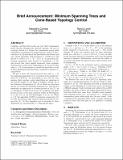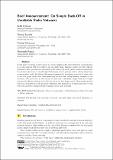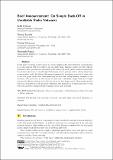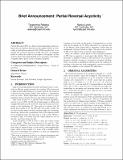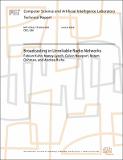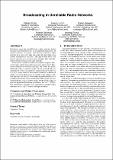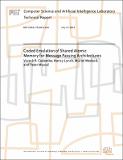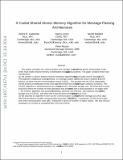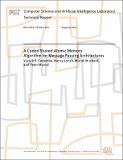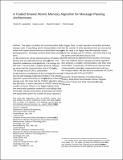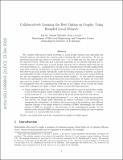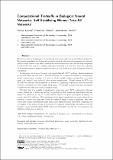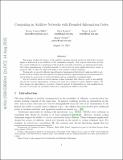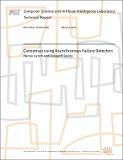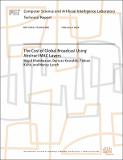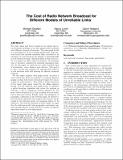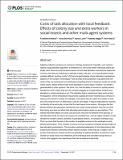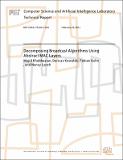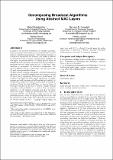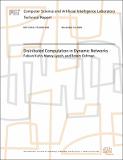Browsing Department of Electrical Engineering and Computer Sciences by Title
Now showing items 21-40 of 108
-
Brief announcement: Minimum spanning trees and cone-based topology control
(Association for Computing Machinery, 2009)Consider a setting where nodes can vary their transmission power thereby changing the network topology, the goal of topology control is to reduce the transmission power while ensuring the communication graph remains ... -
Brief announcement: On simple back-off in unreliable radio networks
(2018)© Seth Gilbert, Nancy Lynch, Calvin Newport, and Dominik Pajak. In this paper, we study local broadcast in the dual graph model, which describes communication in a radio network with both reliable and unreliable links. ... -
Brief announcement: On simple back-off in unreliable radio networks
(2018)© Seth Gilbert, Nancy Lynch, Calvin Newport, and Dominik Pajak. In this paper, we study local broadcast in the dual graph model, which describes communication in a radio network with both reliable and unreliable links. ... -
Brief Announcement: Partial Reversal Acyclicity
(Association for Computing Machinery (ACM), 2011)Partial Reversal (PR) is a link reversal algorithm which ensures that an initially directed acyclic graph (DAG) is eventually a destination-oriented DAG. While proofs exist to establish the acyclicity property of PR, they ... -
Broadcasting in Unreliable Radio Networks
(2010-06-08)Practitioners agree that unreliable links, which fluctuate between working and not working, are an important characteristic of wireless networks. In contrast, most theoretical models of radio networks fix a static set of ... -
Broadcasting in unreliable radio networks
(Association for Computing Machinery, 2010-07)Practitioners agree that unreliable links, which sometimes deliver messages and sometime do not, are an important characteristic of wireless networks. In contrast, most theoretical models of radio networks fix a static set ... -
Coded Emulation of Shared Atomic Memory for Message Passing Architectures
(2013-07-17)This paper considers the communication and storage costs of emulating atomic (linearizable) read/write shared memory in distributed message-passing systems. We analyze the costs of previously-proposed algorithms by Attiya, ... -
Coded Emulation of Shared Atomic Memory for Message Passing Architectures
(Institute of Electrical and Electronics Engineers (IEEE), 2014-08)This paper considers the communication and storage costs of emulating atomic (linearizable) multi-writer multi-reader shared memory in distributed message-passing systems. The paper contains two main contributions: (1) ... -
A Coded Shared Atomic Memory Algorithm for Message Passing Architectures
(2014-08-01)This paper considers the communication and storage costs of emulating atomic (linearizable) multi-writer multi-reader shared memory in distributed message-passing systems. The paper contains three main contributions: (1) ... -
A coded shared atomic memory algorithm for message passing architectures
(Springer Berlin Heidelberg, 2016-06)This paper considers the communication and storage costs of emulating atomic (linearizable) multi-writer multi-reader shared memory in distributed message-passing systems. The paper contains three main contributions: (1) ... -
Collaboratively Learning the Best Option on Graphs, Using Bounded Local Memory
(Association for Computing Machinery (ACM), 2019)<jats:p>We consider multi-armed bandit problems in social groups wherein each individual has bounded memory and shares the common goal of learning the best arm/option. We say an individual learns the best option if eventually ... -
Computational tradeoffs in biological neural networks: Self-stabilizing winner-Take-All networks
(2017)We initiate a line of investigation into biological neural networks from an algorithmic perspective. We develop a simplified but biologically plausible model for distributed computation in stochastic spiking neural networks ... -
Computing in Additive Networks with Bounded-Information Codes
(Springer-Verlag, 2015-11)This paper studies the theory of the additive wireless network model, in which the received signal is abstracted as an addition of the transmitted signals. Our central observation is that the crucial challenge for computing ... -
Consensus using Asynchronous Failure Detectors
(2015-03-02)The FLP result shows that crash-tolerant consensus is impossible to solve in asynchronous systems, and several solutions have been proposed for crash-tolerant consensus under alternative (stronger) models. One popular ... -
The Cost of Global Broadcast Using Abstract MAC Layers
(2010-02-09)We analyze greedy algorithms for broadcasting messages throughout a multi-hop wireless network, using a slot-based model that includes message collisions without collision detection. Our algorithms are split formally into ... -
The cost of radio network broadcast for different models of unreliable links
(Association for Computing Machinery, 2013-07)We study upper and lower bounds for the global and local broadcast problems in the dual graph model combined with different strength adversaries. The dual graph model is a generalization of the standard graph-based radio ... -
Costs of task allocation with local feedback: Effects of colony size and extra workers in social insects and other multi-agent systems
(Public Library of Science (PLoS), 2017-12)Adaptive collective systems are common in biology and beyond. Typically, such systems require a task allocation algorithm: a mechanism or rule-set by which individuals select particular roles. Here we study the performance ... -
Decomposing Broadcast Algorithms Using Abstract MAC Layers
(2011-02-23)In much of the theoretical literature on global broadcast algorithms for wireless networks, issues of message dissemination are considered together with issues of contention management. This combination leads to complicated ... -
Decomposing broadcast algorithms using abstract mac layers
(Association for Computing Machinery, 2010-09)In much of the theoretical literature on wireless algorithms, issues of message dissemination are considered together with issues of contention management. This combination leads to complicated algorithms and analysis, ... -
Distributed Computation in Dynamic Networks
(2009-11-10)In this report we investigate distributed computation in dynamic networks in which the network topology changes from round to round. We consider a worst-case model in which the communication links for each round are chosen ...

